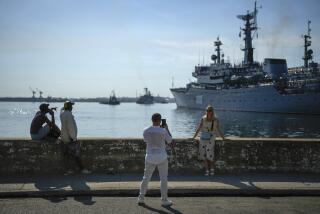Venezuela signs deals with Russia
MOSCOW — Venezuelan President Hugo Chavez was feted here Friday with what are emerging as the trademark tokens of Russian favor: oil and gas deals; the promise of nuclear cooperation; and, most significant, a $1-billion loan to buy weapons.
Moscow agreed to lend Venezuela money to buy a wide variety of Russian weaponry and hardware, said a source in the Kremlin who spoke on condition of anonymity. Reminiscent of Soviet loans to its Cold War allies, the deal is among a number gradually binding the two oil-rich governments, whose ties with the U.S. are strained, into tight cooperation.
Russia has gone out of its way to show off its burgeoning friendship with Chavez. Analysts suggest that Moscow prizes Venezuela almost solely for its proximity to, and its leader’s hostility toward, the United States.
Russia has been enraged by U.S. support of NATO membership for former Soviet states such as Ukraine and Georgia, as well as U.S. plans for an antimissile program in Poland and the Czech Republic. If Washington pressures Moscow in the former Soviet bloc, the Russian elite has long argued, then why shouldn’t Russia exert its influence closer to U.S. borders?
“Latin America is becoming a noticeable link in the whole chain of the emerging multipolar world,” Prime Minister Vladimir Putin said in meetings with Chavez. “This is obvious, and we will pay more and more attention to this area.”
Russia sent a pair of strategic bombers to Venezuela this month for training exercises.
“Russian soldiers, officers and generals made the best impression on our people,” Chavez enthused during his meeting with Russian President Dmitry Medvedev, Interfax news agency reported. “We were filled with admiration.”
In November, Russia is expected to dispatch warships for exercises in Venezuelan waters.
Some analysts have dismissed Russia’s interest in Venezuela as little more than an effort to battle a perception of international isolation.
“This reflects a desperate search for partners and a desperate search for allies,” said Lilia Shevtsova, a senior associate at the Carnegie Moscow Center. “Unfortunately, it’s not only Chavez but Belarus, Hamas and Hezbollah.”
Russia’s crushing military intervention in Georgia last month was criticized by the West as disproportionate. And even nations that seemed neutral or supportive of Russia’s actions have largely balked at joining Moscow in recognizing the independence of Georgia’s two separatist regions, South Ossetia and Abkhazia.
Chavez, too, carefully avoided recognizing the regions.
“We know well what caused the conflict,” he said. “We once again express our complete and firm support for your actions.”
In recent years, his country has ordered more than $3 billion of Russian weapons and military hardware, including helicopters, missile defense systems and dozens of fighter jets. Russia also has sold Venezuela about 100,000 assault rifles and started work on two Kalashnikov plants in Venezuela, Interfax reported.
During Friday’s meetings, Putin also said that Russia was ready to cooperate with Venezuela on nuclear energy. Their ministries signed a memorandum of understanding that sets out plans for an energy consortium. The deal would give Russian companies greater access to fields in Venezuela, which would reap billions of dollars in Russian investments.
--
Times staff writer Sergei L. Loiko contributed to this report.
More to Read
Sign up for Essential California
The most important California stories and recommendations in your inbox every morning.
You may occasionally receive promotional content from the Los Angeles Times.










